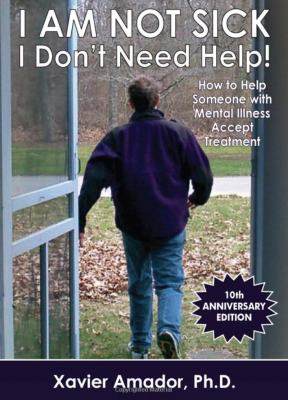Book Spotlight: “I’m Not Sick, I Don’t Need Help”
At the first NAMI West Los Angeles family support group I attended, I was handed materials on NAMI and other local mental health services and advised to read a book, “I’m Not Sick, I Don’t Need Help!: How to Help Someone with Mental Illness Accept Treatment” by Xavier Amador.
The book contains life-changing advice from someone who has been there himself. Dr. Amador, a clinical psychologist, shares the challenges he had trying to communicate with his brother, who lived with bipolar disorder. Dr. Amador’s clinical studies at Columbia University lead him to a better method for relating to those with mental health conditions who, like his brother, often believe, “I’m not sick and I don’t need help!”

Like others in the support group, I had heard those words before. I felt comfort and relief in a room full of people who understood. Soon after that first group experience, I picked up a copy of Dr. Amador’s book and recognized myself on its pages. I had spent years trying to reason with someone with an untreated mental health condition. It was always with a good intention: to get them help. (Note: I’ll use “them/they/their” to protect the privacy and identity of my loved one.) But it wasn’t working.
Conversations with someone who says, “I’m not sick and I don’t need help!” can be frustrating and infuriating. While I prided myself on speaking in a calm, compassionate, and reasonable tone, I sometimes found myself becoming more sharp-toned and insistent, as I realized my advice wasn’t being accepted. Still, I kept trying. I reasoned that because I was committed to helping, I would have to be steadfast in my attempts. Because I make a living as a writer and editor, I felt especially certain my words would have the right impact. If I could just find the right words to make them understand, I could get through to them and inspire them to get the help they needed.
I tried and tried again. Why wasn’t this working? How could they not understand they needed help?!
That is exactly the point that Dr. Amador addresses in his book. What I didn’t understand was that they simply couldn’t understand. So many of our loved ones don’t understand or accept our advice because they have anosognosia — unawareness of one’s illness. This is also referred to as lack of insight, and it’s a common symptom of a range of brain disorders.
That was the a-ha moment for me. When we accept that our loved ones are unable to understand, it gives us an answer to why our countless efforts have failed. We begin to realize that urging our loved ones to get help for a condition they don’t recognize is futile. For me, this meant feeling more compassion for what my loved one was experiencing. It also meant my frustration shifted away from the person, and it opened me up to finding the better method of communicating.
That’s where Dr. Amador’s LEAP approach comes in: Listen; Empathize; Agree; Partner. Overall, the steps help us to communicate more respectfully and effectively. It begins with listening to what our loved ones are saying without judgment. This method helps us talk with, instead of talk to, our loved ones. It helps us reach our loved ones, and connect and collaborate with them on a path forward.
Find out more in the book and from this short video of Dr. Amador’s TEDx talk.


